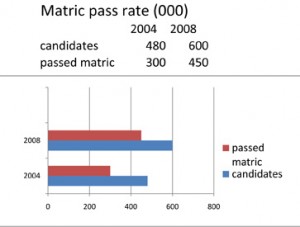Locating Hlalani and Sun City Informal Settlement:
“Sun City”
The name Sun City is synonymous with luxury and leisure for most of us. However the sun rarely shines on the residents of Sun City settlement in Grahamstown. Although the name has connotations of hope and liveliness, the life of the residents at Sun City is anything but bright. Life here is characterized by rampant crime, daily police patrols and juvenile delinquency, but the problems do not end there. For Sun City a much graver problem looms on the horizon in the form of inadequate sanitation. There are only two taps (with many still using the bucket system) and two “public toilets” to provide for its 300 residents. This lack of sanitation is causing serious health hazards among its residents. Children are drinking tap water that is not safe, which is causing concern among residents over the health of the children. Sun City has grown as a shack settlement over the past 11 years but is yet to receive support from the municipality.
Poor sanitation:
There are only two public toilets for all the residents of Sun City. They cannot even afford the luxury of using toilet paper and instead make do with newspapers. Sanitation and hygiene throughout the area is bad and in need of improvement. People cannot live like this!!
A look around the typical house in Sun City:
Imagine a room with no windows as the Grahamstown winter approaches. Imagine a room where 7 people sleep on 2 beds. Imagine a house with no running water or electricity.Picture a room filled with rubbish and junk. This is what Sun City resident Freddy Pokbas calls home.
A resident complains about Sun City:
Sun City residents lack basic services such as water, electricty and adequate hosuing. However, according to one resident this is because…..
Link to Al Jazeera:
Click here to see Al Jazeera’s report on housing in Sun City http://sacsis.org.za/site/article/13.19
“Hlalani”
Hlalani settlement on the other hand appears to be slightly more prosperous than Sun City. As we climb Mount Zion to overlook the entire settlement, we see the various RDP houses which have been recently built. Automatically we are convinced that Hlalani is a settlement undergoing development as it has been earmarked for upgrading. However while interviewing one of its residents we learn that the Mount Zion is in fact used as a toilet site. People who have no RDP houses still lack appropriate toilet facilities and continue to use the bucket system, as a supply of running water is not readily available. If not attended to by the government, settlements such as these will continue to grow as more people come to the inner city seeking employment and accommodation. This could lead to greater sanitation problems.
Pictures of Hlalani Informal Settlement:
Unhappy about life:
This resident explains life in Hlalani Informal settlement, not only for her, but for the other people that live there as well.
Mvuyisile Nonyukhela:
He has been waiting for housing for 14 years, and lives in a small shack which often gets flooded during the rainy season. He makes a living doing pettty jobs and everyday is a challenge for him espeically at his old age. He has norunning water or access to a toilet. Here more about his life….


